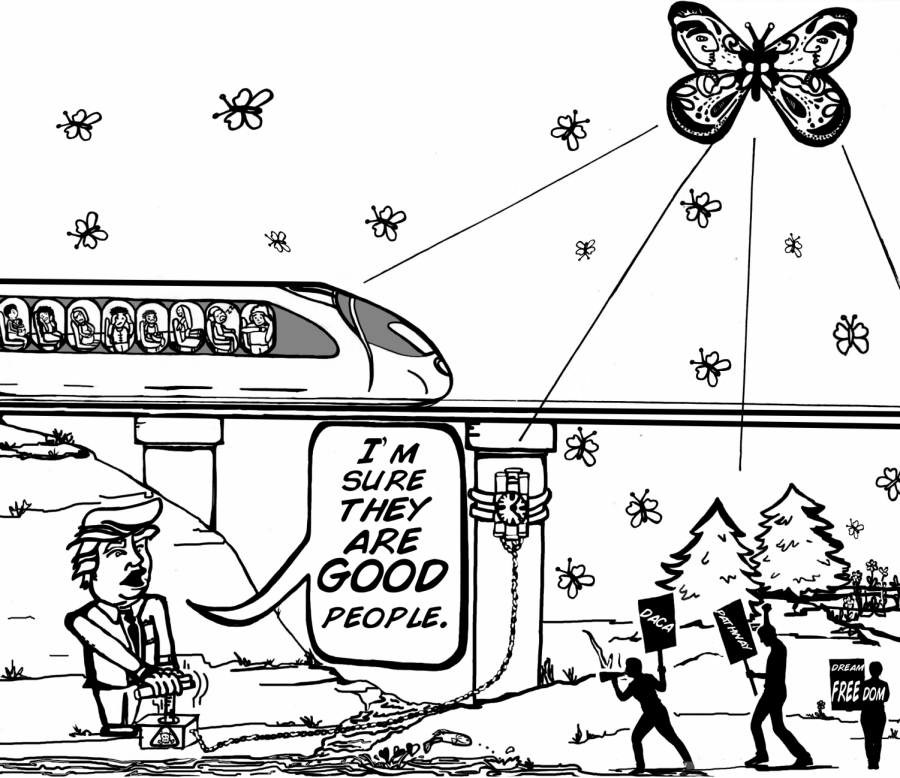Renewed efforts can set pace for clean Dream Act
Dec 11, 2017
The lives of the thousands of undocumented immigrants brought to the United States at a young age are at risk of deportation once their Deferred Action for Childhood Arrivals (DACA) issued work permit and protection from deportation expires.
They will no longer be protected under the Obama administration program that offered an exit from living in the shadows.
DACA is a program created June 15, 2012 and gave eligible undocumented immigrants who came to the United States when they were under the age of 16 a two-year renewable work permit and exemption from deportation.
There are more than 200 such undocumented students enrolled at CCC under California’s AB540, which allows undocumented students to pay resident tuition, according to Contra Costa Community College District statistics. AB540 does not offer protection from deportation.
DACA is set to end March 5, and the clean Dream Act may be the “only resolution that makes sense,” CCC economics major Oscar Martinez, who is enrolled under AB 540, said.
Students like Martinez have spent many years working toward a better life for themselves and their families who brought them to U.S. at a young age.
The 2017 Dream Act, also known as the Clean Dream Act, is a bipartisan piece of legislation that will offer protection for over 2.1 million immigrant youth, including Deferred Action for Childhood Arrivals (DACA) whose future is unclear after the Trump administration moved to end the program on Sept. 5.
The Clean Dream Act paves the path for students who have contributed to the U.S. throughout their many years of living in the United States.
When Trump announced the end of DACA on Sept. 5, he gave Congress six months to establish a permanent legislation solution that extends protection to the 800,000 undocumented immigrants living in the U.S.
Those who would qualify for the Clean Dream Act must have entered the U.S. before turning 18 years old and have been in U.S. for four consecutive years and can pass a background check, according to the National Immigration Law Center (NILC).
Qualifying applicants would first qualify for conditional permanent residence by working, joining the military, earning a higher education degree or meeting a “hardship exception.”
When the termination of DACA was announced, undocumented people and supporters throughout the nation, including students and administrators at CCC, demonstrated their concern by taking action support students on campus through events and tabling.
Although the grace period of DACA deportation protections are set to elapse in less than three months, the initial urgency and support on campus seems to have simmered down.
Some Democrats are threatening to force a government shutdown if the Clean Dream Act is not included in a 2018 spending bill that will be voted on Friday.
Now is the time to re-energize the support and channel it toward urging Democratic and Republican lawmakers to pass the Clean Dream Act.
The enthusiasm and events that took place in September are even more important now as vital support to encourage our community to keep spreading the word about this pivotal moment for Dreamers.



Don Honda • Dec 12, 2017 at 2:44 pm
Is this what to expect from DREAMers?:
http://www.sandiegouniontribune.com/opinion/commentary/sdut-ruben-navarrette-one-dreamers-missed-lesson-2015jun24-story.html
Ruben Navarrette: One Dreamer’s missed lesson in good character
And just who is the typical DREAMer?
http://www.chicagotribune.com/news/opinion/commentary/ct-perspec-dreamers-daca-narrative-0914-story.html
Don’t buy into all of that rosy PR about DACA